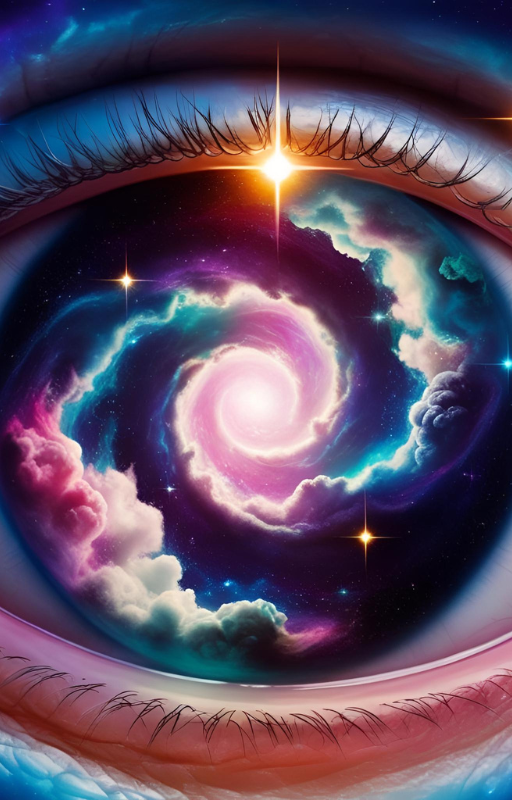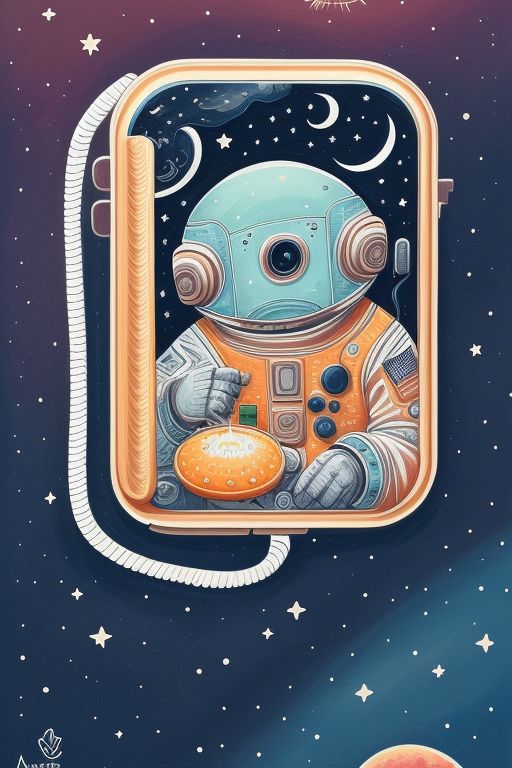The Universe Within
How Our Perception Creates Reality


What we see is not just what exists outside us, but what we create through our perception - our mind's eye forms the universe we experience.
Have you ever found yourself lost in contemplation of that swirling cosmic image, the one with vibrant blues and pinks circling a perfect dark center? I keep coming back to it because it reveals something profound - our perception doesn't just observe the universe, it actively creates our experience of it.
I've been thinking about this a lot lately. Last week, I found myself on my rooftop at 2 AM, unable to sleep, watching stars pulse against the darkness. It struck me then - my eye capturing these ancient photons is itself a cosmic marvel, a product of the same forces that created the stars themselves. The observer and the observed, linked in an endless cycle.
That image reminds me of how the entire cosmos can be reflected in a single moment of perception. The swirling patterns and colors surrounding that dark center mirror the way our imagination wraps around reality, coloring it with meaning and significance. The resemblance between a nebula and the patterns of human thought isn't coincidental.
Our ancestors understood this relationship between imagination and reality. Ancient wisdom traditions didn't separate the observer from the observed as completely as modern science initially did. They recognized that consciousness shapes experience, that perception isn't passive but creative. Modern science has gradually circled back to this wisdom - consider how the neural networks in our brains structurally resemble the cosmic web of galaxies. These parallels speak to a deeper truth about how reality organizes itself across scales.
My neighbor Dave, an astrophysicist at the local university, likes to remind me that the elements in our bodies were forged in stellar furnaces. "You're literally made of star stuff," he told me once over a beer. "The iron in your blood, the calcium in your bones - all of it came from exploded stars." I asked him if that means we're the universe experiencing itself. He laughed and said, "That sounds like philosophy, not physics, but... yeah, in a way."
The thing is, our eyes don't just passively receive the universe - they actively create our version of it. Neuroscience tells us that vision is a constructive process. Our brains fill in gaps, create continuity where there is none, and essentially "hallucinate" a cohesive reality from limited sensory data. In a very real sense, the world you see exists, in its particular form, because your mind has imagined it that way.
I was hiking with my sister in Colorado last summer when we stopped to watch the sunset. The mountains were turning purple, the sky bleeding orange. "It's weird," she said suddenly. "If no one was here to see this, would it look like anything at all?" It's an old philosophical question - if a tree falls in a forest and no one hears it, does it make a sound? But standing there, it felt profound rather than cliché.
Quantum physics has only deepened this mystery. At the subatomic level, the act of observation affects the behavior of particles. The double-slit experiment shows that simply watching electrons changes how they move through space. Reality at its most fundamental seems to respond to consciousness, to shift under the weight of attention.
This isn't just abstract physics - it shapes how we live. The things we focus on, imagine, and visualize tend to manifest in our lives. Not through some mystical "law of attraction," but through the simple mechanism of directed attention. What we look for, we find. What we expect, we create conditions to receive.
I've been practicing this in small ways. For weeks, I visualized finishing the half-marathon I'd signed up for on a whim. When race day came and my lungs were burning at mile nine, it was the mental image of crossing that finish line that kept my legs moving. The finish line existed twice - once in my imagination, and later in physical reality.
Sometimes I wonder if the universe works the same way. Perhaps reality emerges from a kind of cosmic imagination, unfolding from possibility into actuality through the act of being perceived. Maybe consciousness isn't just an observer of reality but a co-creator of it.
This doesn't mean reality is an illusion or that we can simply wish things into being. The world has rules, constraints, patterns. But within those constraints lies remarkable plasticity. The future isn't fixed - it's a field of possibilities waiting to collapse into experience.
When I contemplate that swirling cosmic image, I see more than beautiful colors. I see a perfect representation of how our minds create meaning - a spiraling dance of perception, imagination, and understanding, all emerging from the mysterious center of consciousness. What we imagine shapes what we perceive, and what we perceive informs what we imagine, in an endless creative cycle.
There's something comforting in this perspective. We're not just passive witnesses to a mechanical universe grinding along without us. We're participants in an ongoing creation, our consciousness interwoven with the fabric of reality itself.
Tonight, I'll probably find myself on that rooftop again, gazing up at the stars. But now I wonder - as I look into the universe, and the universe looks back through me, which one of us blinked first? And in that blinking, what new worlds are being born?
Maybe the ancients had it right all along. The eye isn't just for seeing - it's for creating. And the universe isn't just out there - it's in here too, imagining itself into existence with each new dawn, each new thought, each new possibility explored.
Our eyes contain universes, indeed. And the universe, perhaps, is the greatest eye of all.
Get in touch


